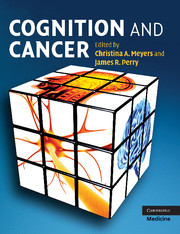Book contents
- Frontmatter
- Contents
- List of contributors
- Preface
- Section 1 Cognition and the brain: measurement, tools, and interpretation
- 1 Introduction
- 2 Clinical neuropsychology
- 3 Brain imaging investigation of chemotherapy-induced neurocognitive changes
- 4 Role of neuropsychological assessment in cancer patients
- 5 Neuropsychological assessment of adults with cancer
- 6 Neuropsychological assessment of children with cancer
- Section 2 Effects of cancer and cancer treatment on cognition
- Section 3 Interventions and implications for clinical trials
- Index
- Plate section
- References
1 - Introduction
Published online by Cambridge University Press: 13 August 2009
- Frontmatter
- Contents
- List of contributors
- Preface
- Section 1 Cognition and the brain: measurement, tools, and interpretation
- 1 Introduction
- 2 Clinical neuropsychology
- 3 Brain imaging investigation of chemotherapy-induced neurocognitive changes
- 4 Role of neuropsychological assessment in cancer patients
- 5 Neuropsychological assessment of adults with cancer
- 6 Neuropsychological assessment of children with cancer
- Section 2 Effects of cancer and cancer treatment on cognition
- Section 3 Interventions and implications for clinical trials
- Index
- Plate section
- References
Summary
Cancer patients experience a number of adverse symptoms, including cognitive impairment, fatigue, pain, sleep disturbance, and others often in combination rather than alone. Fortunately detailed symptom assessment is becoming increasingly recognized as a part of routine patient care by physicians, allied health care providers, and accrediting agencies. Cancer treatment may only be considered successful if these symptoms are managed, but successful management is hampered by insufficient knowledge of mechanisms.
Cognitive dysfunction occurs in the majority of cancer patients on active therapy, and is not infrequently a symptom that heralds the diagnosis. In addition, it persists in a substantial number of patients long after treatment is discontinued. In some situations this type of cognitive dysfunction is popularly termed “chemobrain” or “chemofog” although cognitive impairment can be due to a large number of factors (Table 1.1), many of which are discussed in detail throughout this text.
The components of cognitive dysfunction will vary as a result of the specific etiology, but there are several core cognitive domains that appear to be differentially affected. Cancer patients with cognitive dysfunction often present with complaints of memory disturbance. However, objective testing of memory generally demonstrates a restriction of working memory capacity (e.g., the person is able to learn less information, and learning may be less efficient), and inefficient memory retrieval (e.g., spontaneous recall may be somewhat spotty).
- Type
- Chapter
- Information
- Cognition and Cancer , pp. 3 - 5Publisher: Cambridge University PressPrint publication year: 2008
References
- 1
- Cited by



